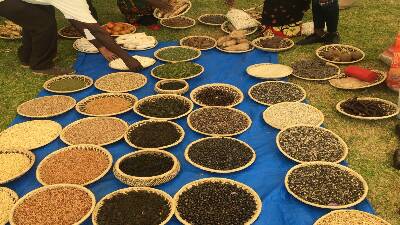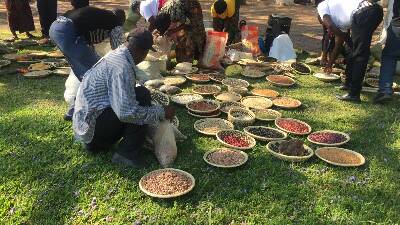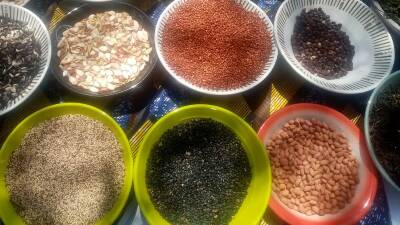Seeds treaty must help halt corporate takeover
At a meeting of the International Seeds Treaty in India next week, governments will discuss how small hold farmers, peasants’ and Indigenous Peoples’ can use and manage their own seeds. Peasant and Indigenous Peoples’ organizations are mobilizing to assert their rights and fight laws that threaten their livelihoods while boosting the profits of agribusiness corporations.
Why should we care about seeds?
The issue of who controls the world’s seeds has never been more important. Resilient seeds are essential for food security and climate crisis adaptation. Transnational agribusiness corporations are making a huge push to consolidate their control over the international seed market, lobbying for laws that criminalize communities’ seed practices and expand commercial control of seeds.
“Because seeds are so central to people’s cultures and food systems, to control seeds is to control life,” said Michael Fakhri, Special Rapporteur on the right to food, in his latest report to the UN Human Rights Council.
Just four agrochemical companies – Bayer-Monsanto, DowDuPont/Corteva, ChemChina-Syngenta and BASF – control more than half of the global seed market, worth an estimated US$1 trillion in the coming decade. Patents and other intellectual property laws, have massively contributed to their dominance. They know that whoever controls seeds controls food. They take seeds from communities in the Global South and sell them back to them – using patents and new “plant variety protection” laws to criminalize farmers for cultivating seeds as they have done for centuries.
Governments have discussed this issue for years without agreement. But they have a chance to move in the right direction at a key meeting of the International Seeds Treaty (ITPGRFA) in Delhi on 19 to 24 September.
What is the seeds treaty?
The International Treaty on Plant Genetic Resources for Food and Agriculture (ITPGRFA) – also known as the International Seeds Treaty – sets out rules for how seeds and plant genetic material can be used.
It the only binding international agreement that recognizes peasants’ and Indigenous Peoples’ rights over seeds which they have selected from their fields and passed on for generations. It recognizes “farmers’ rights” to save, use, exchange and sell farm-saved seeds and requires states to protect and promote them.
The treaty explains that these rights are based on past, present and future contributions of peasants and Indigenous Peoples to the conservation of biodiversity. It was adopted in 2001 after decades of pressure from farmer’s rights activists fighting rules and laws that hand the control of seeds over to agribusiness corporations. So far 149 countries have signed up to it.
For thousands of years, peasant and Indigenous communities have carefully cultivated, selected, and saved seeds from the most climate-resilient, high-yielding, nutritious, and flavorful plants each season. They’ve held onto those seeds, and exchanged or sold them within their communities, for replanting in the following season. This replanting is impossible with commercial seeds which must be bought each year and often require synthetic fertilizers and pesticides.
What use is a treaty?
The fact that the treaty guarantees peasants’ and Indigenous Peoples’ rights over their seeds makes it a very important reference for their struggles. Around the world, organizations are advocating for their governments to enshrine farmers’ rights into national legal frameworks. Without good laws, peasants and Indigenous Peoples can be easily criminalized for their seed management practices.
However, the Treaty is also targeted by the seed industry which seeks to undermine the implementation of farmers’ rights through regimes like UPOV – an international organization and convention for new plant varieties – that introduces laws restricting what small farmers can do with their seeds. They want to make sure that their own commercial interests are prioritized. One way of doing this is to get governments to interpret the treaty in a way that puts intellectual property rights, including patents, above farmers’ rights.
Recent pressure from peasant and Indigenous Peoples’ organizations has forced the treaty’s Governing Body to recognize that farmers’ rights are not being sufficiently implemented but now concrete action is needed to do something about that.
Peasant and Indigenous Peoples’ rights over seeds are human rights, as opposed to the commercial rights claimed by the industry. Their seed systems are fundamentally different from commercial systems and must be protected by specific laws.
What is at stake now?
From 19 to 24 September 2022, governments will take several important decisions in a meeting of the treaty’s Governing Body, which takes place every two years. Two issues are particularly relevant:
- Farmers’ rights: governments will discuss the relationship of farmers’ rights and intellectual property rights (IPR). If the seed industry, UPOV and the governments supporting them get their way, then it may allow countries to limit farmers’ rights with IPR such as patents or UPOV-based plant variety protection (PVP) laws. This would have major implications for peasants and Indigenous Peoples around the world .It would pave the way for more seed grabbing and more criminalization of farmers.
- Digital Sequence Information (DSI): the sequencing of genetic information and its storage in digital formats is a major threat to peasants’ and Indigenous Peoples’ rights over seeds. Digital sequencing opens the door for a new wave of seed grabbing and bio piracy. If all seeds are sequenced and made available, then the seed industry can access them, patent those sequences that encode desirable traits (e.g. drought resistance) and use them for new plants that are developed through biotechnologies. Peasants and Indigenous Peoples could then be forced to pay royalties for using their own seeds of they contain a patented genetic sequence.
What are peasants and Indigenous Peoples asking for?
Peasants’ and Indigenous Peoples’ organizations represented in the International Planning Committee for Food Sovereignty (IPC) are mobilizing to ensure that the Governing Body takes decisions that respect, protect and guarantee their rights. Some of their main demands include:
- Recognizing that peasants and Indigenous Peoples have rights over seeds (“farmers’ rights”) mainly through their own, distinct seed systems – as compared to commercial seeds – and that these need to be protected through specific national legal frameworks.
- Clarifying that peasants’ and Indigenous Peoples’ rights over seeds are human rights and that farmers’ rights cannot be subject to intellectual property rights, including UPOV.
- Preventing the Treaty becoming an instrument for industrial seed piracy of seeds using DSI.
- Recommending that governments outlaw patents on the genetic sequences of seeds.
What can you do?
National governments will decide what decisions are made on the future of seeds. You can support small hold farmers, peasants and Indigenous Peoples by asking your government to defend their rights, rather than further enrich and consolidate the power of agribusiness corporations:
- Share this information on social media
- Write to your national focal point for the ITPGRFA
For more information contact Tom Sullivan, FIAN International Communications and Campaigns:Tel +90 534 230 0346/WhatsApp: +46 73 046 2753/ sullivan@fian.org







